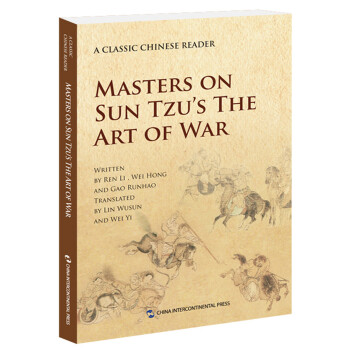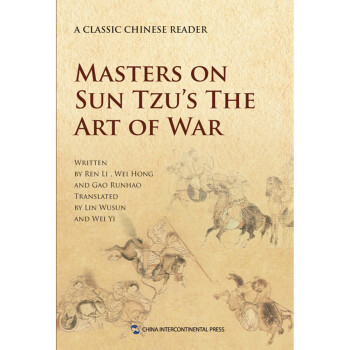精彩书摘:
Chapter1 Making Assessments
The chapter of Making Assessments discussed the top-level strategic planning before war. Sun Tzu believed that war is a question of vital importance to the state. It requires careful research, deliberate planning and discreet decision-making. Making Assessments discussed two major issues related to war: the decisive factor of the outcome of war and the guiding principle of commanding in war. These are the basic questions of any military theory and also the foundation of other issues related to war. Sun Tzu’s answers to the questions embody his basic understanding of war and the guiding principles of commanding in war. They are the standing points of his military theory.
How to Plot A War: Decision-making in the Imperial Court
In ancient China, the place where kings worshipped their ancestors was called “imperial ancestral temple”. It also referred to the imperial court where all military and
political events were discussed and decided. This kind of discussions and decisions are called “decision-making in the court”. In the ancestral temples with memorial
tablets of past generations displaying, the decisionmakers plotted strategies for wars in solemn and respectful atmosphere. This embodies the prudence and discretion
of ancient Chinese toward war. According to Sun Tzu, war is a question of vital importance to the survival of a state and a matter of life and death. Hence, the decisionmakers
must make deliberate and meticulous strategies and correct decisions in the court before taking any actions. Sun Tzu’s contrivance of decisions in the court include several sections such as the military strengths on both sides of the war, result forecasts of the war, and strategy-making during war. These decisions are similar to strategic decisions in modern warfare. Besides, Sun Tzu also discussed the issue of the implementation of strategic decisions. He argues that once the decision-making in the court is over the leader should appoint generals who can carry out these decisions and dismiss and replace those who cannot in order to ensure that correct military decisions will turn into successful military actions.
Based on this expounding of “decision-making in the court”, we infer that in the court decision-makers held a calculation tool called “counting rods” in their hands to
compare and calculate in meticulous details the strong points, weak points, advantages and disadvantages on both sides of the war. The results may be classified into
three including “make full assessments”, “make insufficient assessments” and “make no assessments”. “Making full assessments” ensures favorable conditions or a higher
chance or probability of winning. “Making insufficient assessments” means a few favorable situations or a small probability of winning. When “making no assessments”,
the leader has no condition to win or his probability of winning the war is nil. In this discussion, the outcome of the war becomes self-evident. Decision-makers should
accord with this principle t o discuss and decide strategic issues such as whether to and how to wage a war. This is the basic process of decision-making in the court. It
is sometimes carried out in the temporary commanding post in barracks in the wilderness. Still, prudent attitude and reasonable assessments cannot be compromised. These are no etiquette or formality, but the integral process of determining the process and outcome of the war. According to ancient Chinese, this is called “devise strategies within a command tent and win a victory thousands miles away”.
Sun Tzu’s idea of “decision-making in the court” lays a foundation for the formation and development of ancient Chinese theory of decision-making during the war. The relatively complete and systematic theory of decision-making in war originated over 2,000 years ago in China has exerted a great impact on Chinese and even the
world history of military thoughts. Guided by the theory, decision-making in war is more scientific, instructive and normative. War thus becomes a more reasonable and
controllable action. The Korean War during the 1950s is the largest local war in scale since WWII. Before sending Chinese troops to enter the war, the leaders of the newly founded China made thorough military strategies and full preparations which well inherited Sun Tzu’s idea of “decision-making in the court”.
Sun Tzu’s idea of “decision-making in the court” raised the importance of prewar strategic planning and decision-making . However, there have been some exaggerations of the importance of decision-making in the court during Chinese history. Some held that prewar decision-making is a cure-all and blindly pursue the zerorisk decision. They thought that a comprehensive prewar decision-making ensures victory in every fight and ignored the complicated nature of war and the ever-changing battlefield. During the Song Dynasty in ancient China (960 AD-1279 AD), the Emperor Taizong of Song (Zhao Guangyi) preferred to inform the generals who were going out to war of the general strategies and system of battle formations (formations and array) that he pre-designed. He ordered these generals to strictly carry out these plans in the battlefield. This deprived the generals of their rights to tackle with the actual situations in the battlefield as the occasion requires and squelched their talent as a field commander. It is not in line with Sun Tzu’s original intention. In his theory, Sun Tzu explicitly set forth that kings should not randomly intervene in the generals’command (The ruler who does not interfere with capable generals shall win the war) and encourage them to adopt flexible and maneuverable methods of warfare according to specific situations of the enemy (Defeating enemy basis on their situations). He held that despite its importance, decision-making in the court is only a part of directing a war. It is self-evident that decision-making in the court cannot replace other guiding principles in war.
……
作者简介:
任力,中国人民解放军军事科学院资深研究员,博士生导师,中国孙子兵法研究会副会长。
魏鸿,中国人民解放军军事科学院研究员,中国孙子兵法研究会资深学者。
高润浩,中国人民解放军军事科学院研究人员,中国孙子兵法研究会资深学者。
内容简介:
《孙子兵法》是中国战略理论的经典之作。它深刻揭示了古代战争和战争指导的基本规律,对现代战争仍然具有十分重要的启示意义。本书力求以文图并茂的形式,配合古今中外战争实例,对《孙子兵法》原文和孙子的思想进行准确而深入浅出的诠释。
目录:
Introduction
Chapter1 Making Assessments
Chapter 2 Waging War
Chapter 3 Attacking by Stratagem
Chapter 4 Disposition
Chapter 5 Disposition
Chapter 6 Weaknesses and Strengths
Chapter 7 Contest to Gain the Initiative
Chapter 8 Varying the Tactics
Chapter 9 Deploying the Troops
Chapter 10 The Terrain
Chapter 11 Nine Regions
Chapter 12 Attacking by Fire
Chapter 13 Using Spies






好评度